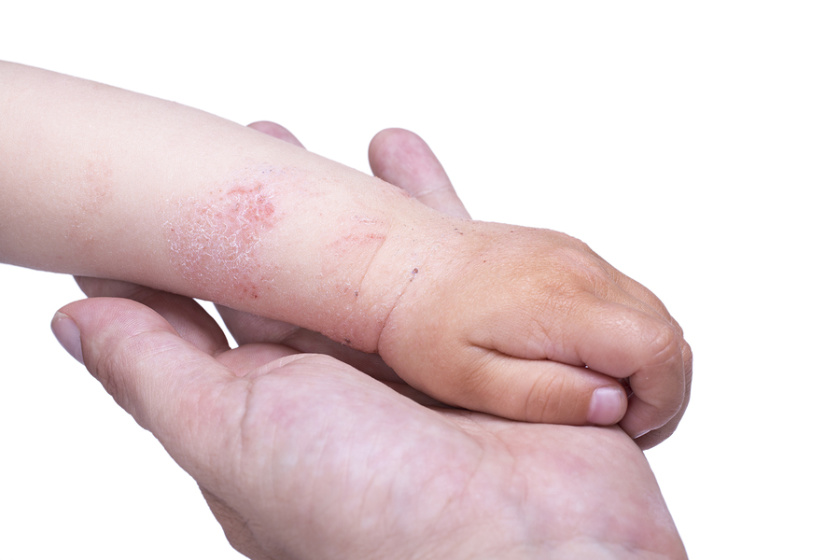
Did you know? One third of children who have moderate to severe eczema also have a food allergy. So, what is the link between these two conditions? And is there anything you can change in your child’s diet to help treat eczema? Read on to find out.
What is eczema?
Eczema is a skin condition, which causes red, itchy areas on the skin. Scratching can cause the skin to break, ooze and then crust over.
Eczema is more common in children than adults. Some children outgrow it, but it can also return later in life.
What is a food allergy?
A food allergy is when the body’s immune system thinks a food protein (like nuts, soy or milk) is harmful. This causes the body to have symptoms of an allergic reaction like:
- Flushed face, hives or a rash, red and itchy skin
- Swelling of the eyes, face, lips, throat and tongue
- Trouble breathing, speaking or swallowing
- Cramps, diarrhea, vomiting
Food allergies are more common in children than adults. Children can outgrow some food allergies.
Does eczema cause food allergies?
Eczema increases the chance of developing a food allergy. If your child’s scratched open skin is in direct contact with a food allergen, such as peanuts, the food allergen can get into the body more easily and may cause the immune system to react.
Keeping eczema under control may help prevent food allergies because healthy skin will help stop food allergens from getting into the body.
Does having a food allergy cause eczema?
No. Food allergies do not normally cause eczema. Food allergies and eczema are two separate conditions. However, food allergies are more common in children who also have eczema.
Will taking probiotics help my child’s eczema?
At the moment, more long term research is needed to know for sure if probiotics help treat eczema in children. If you are considering giving your child a probiotic, consult with your dietitian or healthcare provider. Many foods like yogurt, also contain probiotics.
Are there any other dietary changes I can make to help treat my child’s eczema?
A variety of nutrients have been studied for treating eczema, such as fish oil and vitamin D. Currently, there is not enough research to say whether specific dietary changes will help treat your child’s eczema. Offer your child a
balanced diet that includes vegetables and fruits, whole grains and proteins.
Is there anything I can do to prevent my baby from developing eczema?
Some research shows that breastfeeding may reduce the risk of your baby developing eczema in the first two years of life. Health Canada and the World Health Organization recommend babies be fed breast milk exclusively for the first 6 months of life and continue to breastfeed for up to 2 years or more along with the introduction of solid foods at 6 months.
How can a dietitian help?
If your baby is at a higher risk of developing food allergies, a
dietitian can give you guidance on introducing solids safely. They can give you advice on when and how to offer allergen foods. A dietitian can also review your child’s diet to make sure they are getting all the important nutrients they need to grow and develop.
Connect with a dietitian today!
Bottom line
Eczema can increase the chance that a food allergy develops. However, a food allergy does not cause eczema. Eczema cannot be cured, but it can be managed. Talk to your health care provider for advice if your baby has eczema.
You may also be interested in:
Food Allergies and Babies
Food Allergies and Intolerance
Introducing Solid Food to Your Baby
This article was written and reviewed by dietitians from Dietitians of Canada
Last Update – January 17, 2022